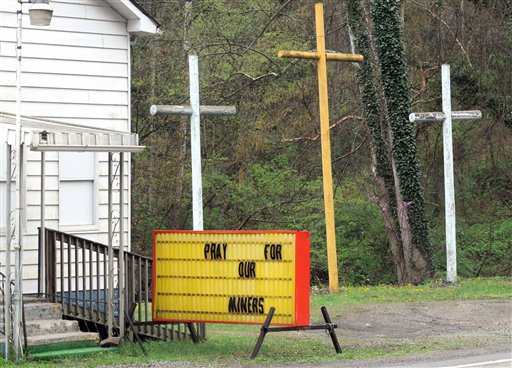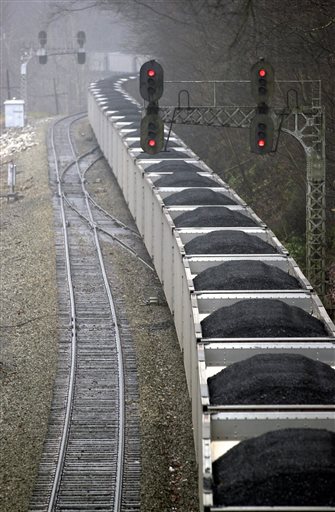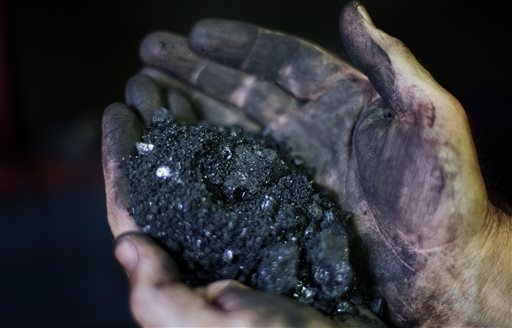And now … West Virginia’s latest ‘mine safety’ bill
March 14, 2017 by Ken Ward Jr.
A sign for the Upper Big Branch miners is seen in front of a church in Eunice off of Route 3, W.Va. on Thursday, March 8, 2010. .(AP Photo/The Register-Herald, Rick Barbero)
West Virginia led the nation in coal-mining deaths last year and we’ve seen two coal miners — including one working at one of the governor’s operations — die on the job so far in 2017.
So obviously, it’s a good time for lawmakers at the Capitol to start focusing on coal-mine safety. And what better time to introduce what is certainly the most sweeping mine safety bill in many years than on a Saturday session of the state Senate, right?
After an initial glance at Senate Bill 582, here’s what United Mine Workers President Cecil Roberts had to say over the weekend:
We are reviewing the legislation to make sure we fully understand the impact it will have on working miners. This is the first opportunity we have had to see any of this language. The fact that this bill was introduced on a Saturday when it would get the least amount of media coverage tells you all you need to know about how proud its authors are of it. When legislators are afraid of the people finding out what they are doing, something is wrong.
 The bill, sponsored by Sen. Randy Smith, R-Tucker and a Mettiki Coal official, is 106 pages long and is — to borrow the word used by longtime mine safety advocate Davitt McAteer — “breathtaking” in the extent to which is essentially eliminates any meaningful role for the state Office of Miners’ Health, Safety and Training in enforcement of safety and health protections for West Virginia’s miners.
The bill, sponsored by Sen. Randy Smith, R-Tucker and a Mettiki Coal official, is 106 pages long and is — to borrow the word used by longtime mine safety advocate Davitt McAteer — “breathtaking” in the extent to which is essentially eliminates any meaningful role for the state Office of Miners’ Health, Safety and Training in enforcement of safety and health protections for West Virginia’s miners.
For example, instead of conducting “inspections” at the state’s mines, the office would only perform “compliance visits and education.” Actual enforcement actions could only be taken against mine operators if a state employee discovers conditions that present imminent danger to workers — unless, of course, the infraction was committed by an individual miner. The state’s “Individual Penalty Assessments,” which target mostly mid-level foremen and not companies or corporate agents, would remain part of state law, under the bill.
Oddly, in a state where coal industry officials and their politicians have spent so much time bucking any role for the federal government in regulating mining, the bill also eliminates a long list of West Virginia safety and health standards and says that instead of those standards, mine operators must simply follow U.S. Mine Safety and Health Administration rules.
There’s a lot of other stuff in this bill, including some confusing provisions about the Department of Environmental Protection’s Special Reclamation Fund, a program that is of growing importance as the state faces the decline of the coal industry and the legacy liabilities that often poorly regulated mining has left behind.
The bill is on the agenda today for a 1 p.m. meeting of the Senate Energy, Industry and Mining Committee, which is chaired by Sen. Smith. Two of the bill’s other three sponsors are also on the committee, if that gives you any idea whether this legislation is set to get moving.
This would be the third year in a row that West Virginia lawmakers have moved to weaken coal mine safety and health protections (see here and here). And before you blame the Republicans, recall that a Democratic-controlled Legislature and a Democratic governor didn’t exactly pass meaningful mine safety reforms in the wake of the Upper Big Branch Mine Disaster.
Stay tuned …

 Subscribe to the Coal Tattoo
Subscribe to the Coal Tattoo




















